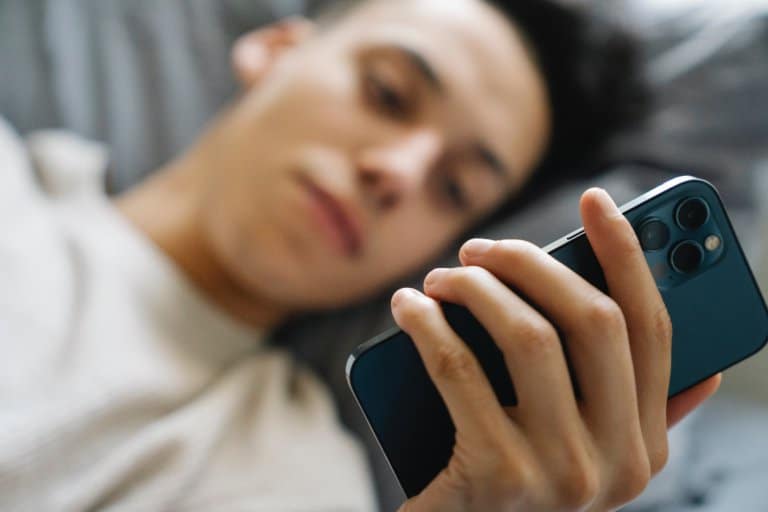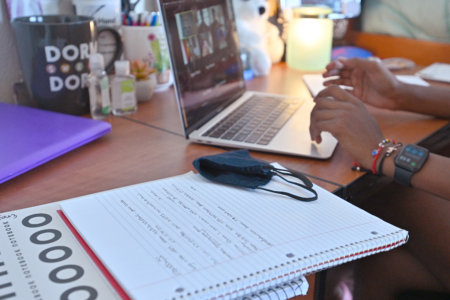
Is social media addictive? For many of us, the answer is probably yes.
Data from leading audience targeting company GWI reveals that the typical social media user actively uses or visits an average of seven different social platforms each month, and spends an average of two hours and 21 minutes per day using social media.
If you’re a student or in your mid-to-late 20s, you’re probably always looking at your phone in between studying or work. You probably can’t go to sleep without scrolling through Instagram or Reels, or getting your daily news from Reddit or X (formerly Twitter).
And then there’s TikTok, readily providing hours of brainrot content on end. Close the app, and then 20 minutes later, you’re back on it again.
This begs the question: why is social media addictive, and what exactly is it about such platforms that keeps people coming back?

Just be careful when you’re using your phone while walking in public. Source: AFP
Why is social media addictive?
The simple answer is that social media is designed to keep you constantly engaged.
For example, TikTok’s algorithm uses your likes, comments, watch time, and shares to rate how appealing a video might be to you. The more time you spend watching a video about certain content — movie reviews, games, beauty product recommendations, etc — the more you’ll see pop up on your feed.
Then there comes the good old question of, is my phone like, spying on me? No honey, it’s just reading you like an open book.
When we explore new things, our brains release dopamine, signalling that it is something new to pay attention to. Thanks to algorithms that push content personalised to our preferences, these apps release large amounts of dopamine into our brains at once, creating highly addictive platforms.
The end goal is always to keep you coming back for more — and it’s working. As of February 2025, 5.56 billion individuals worldwide are active internet users, which amounts to almost 68% of the global population.
Research projects that the average adult will spend at least six years and eight months of their life on social media. And while we wouldn’t call it a waste of time entirely, it’s still a massive distraction from more important things, like exams.

Date night. Just you, me, some takeout, and our iPads. Source: Pexels
How to avoid getting distracted by social media
The rapid digitalisation of the world has created a society that’s becoming increasingly distracted by social media.
Instead of focusing on tasks at hand, we tend to keep reaching for our phones, tablets, and laptops, searching for bouts of instant gratification. Take this author for example — I’ve taken two breaks to look at news updates on X since starting this article. Sigh.
Is social media addictive in this sense? Studies have shown that excessive social media use can be equivalent to drug addiction — so maybe we should take a step back before we fall into that category.
Here are some tips on controlling your social media use that you can use when you’re preparing for exams, working, or at any moment when you need to lock in:

Don’t miss out on important notifications! Source: AFP
Turn off notifications on your phone
Turn off those annoying push notifications. It’s not like you even look at them anyway.
These notifications are designed to remind you of your social media account. When your phone is idle or not being used, the app sends out a pop-up message — which, when clicked, brings you right back to where you started.
But remember that you don’t have to turn off your phone entirely. If you’re studying abroad or living alone, there will always be the possibility of your family attempting to contact you, and they will start getting anxious if they cannot reach you.
Sometimes there will also be emergency alerts or natural disaster warnings, which can be unexpected and even dangerous if left ignored.
Try toggling with your notification settings on your phone and turning social media ones off. If you’re an iPhone user, the phone has a “Focus” setting that will minimise distractions, but still allow important notifications, alarms, and calls through. This will cut off any excessive browsing or scrolling.

Block out specific times of the day for social media use. Source: Pexels
Use a productivity app
Need to get your assignment done or focus on your work for hours at a time? Downloading a productivity app is a great idea.
They keep you focused, offer smart ways to organise your workload, set reminders, lock away distractions, and more.
For example, Forest is an app that keeps you from using your phone. Whenever you want to begin a new study session, you can choose to plant a “tree”.
If you exit the app to browse other areas of your phone, your tree will slowly wither and die. The longer you keep the app open, the more trees you are able to grow. Fun!
Some people choose to download apps that block social media access entirely, or limit it to a few minutes or hours a day. One Sec, BlockSite, AppBlock and Flipd all offer customisable blocklists, scheduled blocks, and in extreme cases, total lock modes for the ultimate distraction prevention.
International graduate Amirul Harith recommends ScreenZen, which introduces a delay in all social media apps and asks users, “Is it important?” before unlocking. The wait time will increase each time you open your app, which discourages multiple uses in a row.

Suntanning on a windy beach is the perfect time to scroll social media, not when you’re cramming for an exam. Source: AFP
Schedule out times for social media
Is social media addictive? Yes. Is it impossible to control this addiction? Far from it.
You don’t have to eliminate social media from your life — you just need to learn to exercise some self-control. It’s hard, but definitely doable.
The best way to do this is to block out specific times of the day dedicated to browsing or turning your brain off with some TikTok videos.
You could do it an hour or two before bed as you wind down, but there’s always the danger of taking it toooo far and doomscrolling till late. We know how tempting it is.
Our suggestion would be to do most of your browsing mid-way through your day, or even as you’re eating lunch or dinner — as long as you’re alone, of course. Don’t scroll social media if you’re eating with friends and family — do some actual socialising!
Delete your apps entirely
A drastic measure not for the faint-hearted, but undoubtedly the most effective way to beat the addiction.
It’s not forever, of course. Delete the social media apps from your phone, or deactivate your socials just for a while. The hassle of re-downloading, logging in, and verifying your identity will put off the urge to check your apps as often.
Who knows — going cold turkey may just do wonders to improve your mental health, as you’ll be cut off from the constant negativity online.
Either way, you’ll see your dependence on social media change drastically with this practice. Good luck (and stay strong)!
Disclaimer: This article was last updated on April 18, 2025.










